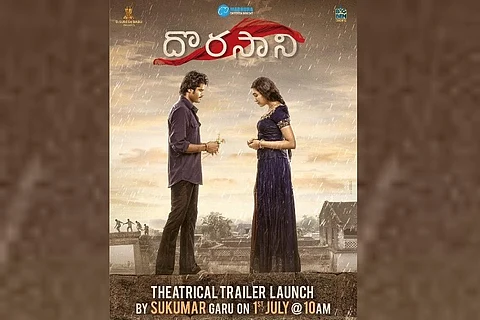

The story of star-crossed lovers fighting against all odds, risking it all just to hold hands once, infuriating families and entire societies for that one hug and kiss, is not a new one. Dorasani gives it a different backdrop, this time a village in the interior undivided state of Andhra Pradesh, where zamindars own everything including lives, cops use naxalism as an excuse to “encounter” anyone who rubs them the wrong side.
With Anand Deverakonda and Sivatmika playing the lead roles, the movie tries to portray the plight of people in a world where social tiers are extremely powerful. Raju, the lover, standing in the rain outside her window for that one glimpse evokes the charms of old-world, pre-social media love. The accents in the movie are indigenous and the setup is authentic. There are not so subtle indications of exploitation of all kinds, including the way zamindars imposed themselves on women of castes they openly considered below them - something the caste system endorsed.
However, despite the rather powerful backdrop and narrative, Dorasani falters heavily, ending up more as an amateurish attempt, rather than an insightful, social commentary.
KVR Mahendra, the man behind the movie, seems to be conflicted between the social injustice and the romance and he fails in tying the threads together. Oddly, the movie doesn’t show the guts to eviscerate a hard-hitting theme, shying away from the kind of physical violence that is rather the norm than an exception, when it came to dealing with such transgressions. Most of the scenes involving physical brutishness have been avoided, not that it is mandatory, but it certainly takes away from the true depiction of reality. It doesn’t build characters much either. The lead actors barely have good lines, and while Sivatmika seems comfortable in front of the camera, the same cannot be said of Anand.
One of the things that affect the viewing of the movie is the discontinuity of scenes. To establish the villainy of the zamindars, a farmer is shown to rebel, only to be murdered that night. That brief bit comes out of nowhere in the middle of the love story.
Most of the second half barely helps the audience connect/relate to the protagonist’s parents. They are just shadow roles which do not evoke much emotion. The protagonist, mostly writing poetry on walls, is rather uncommunicative too, even when in pain - physical and emotional. It doesn’t help that his most emotional moments have been picturised in low light. The uncommunicative spirit is a pattern throughout the movie where things aren’t spoken out in detail, and the director probably assumes the audience understands it from the silence or gestures. Nevertheless, the screenplay and symbolism aren’t so powerful, engrossing or realistic that the audience can empathise with what’s happening.
It doesn’t help that the few moments of romance that the screenplay manages to conjure, barely have the chemistry or the magic that can justify two youngsters taking extreme steps and taking on the system. It is also odd that the movie uses a lot of actors - cops/naxalites/the female protagonist’s brother as mere props.
Despite so many elements in the movie, the screenplay lacks cohesion. The climax does give an interesting closure to the theme - of how deep the lines run even amongst the educated - but the rest of the narrative seems staid, more like a bunch of short films put together. The soundtrack by Prashant Vihari is impressive and deserved a better setup to sink in. It blends elements of folk and Carnatic without overdoing the pangs of sadness mixed with the fluttering nerves of first love.
All in all, Dorasani tries to tackle a young-adult love story across social tiers in a different era (read 60s, 70s, 80s, but then caste killings are still relevant today, aren’t they?). Nevertheless, it fails to develop the fresh local perspective that seemed for a bit, to be its USP.
Disclaimer: This review was not paid for or commissioned by anyone associated with the series/film. TNM Editorial is independent of any business relationship the organisation may have with producers or any other members of its cast or crew.